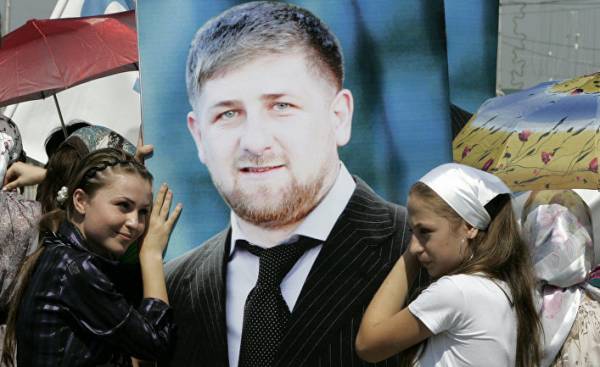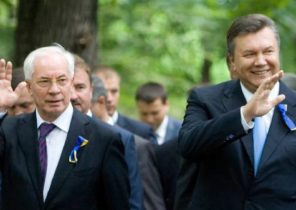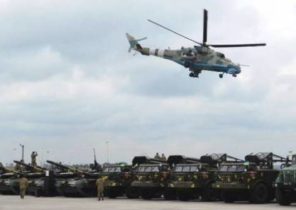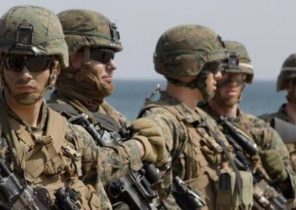
In the North Caucasus — the same problems in education, and across all Russia: shortage of places in kindergartens, overcrowding of classrooms, low levels of education in universities. But there are also regional differences. For example, preschools controls the Centre for combating extremism for the children of militants and security forces create special schools, and the graduates continue education in Saudi Arabia.
Kindergartens and preventive care
10 January in Makhachkala to a private children’s center “Happy baby” on the street Hungarian soldiers drove four cars. They came from the people in civilian clothes climbed over the gate and entered the building. In the garden there were 23 children and 6 teachers. When, after a call from the teachers in the centre have arrived the founder of the kindergarten, inside there was no one.
“Teachers were taken to the police station, and parents who came for the children, said that I am the extremist and Wahhabite,” — says the Director of the centre of Sofia named Sultanbekova. One house on the same street is the Salafi mosque “Tangyin” — from the left in the “Islamic state” (banned in Russia — approx.ed.) the preacher Nadir Medetov, known as Nadir Abu Khalid. His fate is unknown. In 2015, many Ministers of the mosque was a criminal action.
A similar visit, the police organized the same day in another branch of the kindergarten. Later at the police station Sultanbekova explained the reason for such attention — she is under police surveillance on suspicion of extremism. The assurance of the police, her children’s center will no longer work.
The system of preventive accounting in Dagestan — a process based on the order of the regional Ministry of internal Affairs (MIA). The document says that the police are obliged “to take measures to identify persons who adhere to extremist ideology.” On what criteria correspond to such persons, is not a word.
The police, according to Sultanbekova, convince her that now she will not be able to engage in commercial activities that began in 2014. “The problem is that I am in hijab and the hijab. The police told me to I work took those scarves, and the garden did not take the children with mothers in hijab go,” explains named Sultanbekova. Other reasons to put her on the account was not, she said.
In the custody of security forces
Statement on the preventive account is not the only practice used by the regional authorities to monitor citizens. Another specific initiative in the field of education was the desire of the mufti of Dagestan to create a boarding school for the rehabilitation of children-orphans from the families of dead militants. In this study they will be together with the children of security forces.
While the project is at the stage of registration of ownership and the educational part is not yet developed. Students can become orphans and children who have left only the mother, but the emphasis is on the psychological work.
Analyst at the International crisis group, Yekaterina sokyryany negatively assesses the initiative of the authorities of Dagestan to organize a private boarding school, as such an attempt of segregation of children of militants, even from good motives, may have a negative effect. Adolescents, according to Sokiryanskaya, they ask questions about why they were there. At the same time will work with them the traditional religious leaders that their families are not respected and do not have the necessary level of confidence that, on the contrary, would close the children themselves.
“The vast majority of women whose husbands were killed during special operations, not voluntarily give up their children there. I called some of them, they perceived this initiative as an attempt to take away their children. Moreover, the school was planning to build in the village, far from Makhachkala, few people want to send their children there,” — said sokyryany.
A similar project, in which orphans from families of the militants and the security forces will deal together, decided to organize in Ingushetia. In February it became known that at the initiative of the head of the Republic Yunus-Bek Yevkurov will be a special public Council, which will oversee the children’s organization. It will include public figures and widows of militants.
Students whose parents died as a result of the armed conflict, will visit museums and participate in the work of the Patriotic club “Tuchulcha” (Ingush — “Hero”). Officials also promise them psychological assistance and employment assistance. In administration of Ingushetia believe that the project will contribute to the eradication of extremism.
According to the head of the Ingush human rights organization “Mashr” Magomed Mutsolgov, the initiative is doomed to failure, as in the Caucasian society is not accepted to mention in a family action, much less talk about it to children. “The country already has all the social agencies that are responsible for education. Now it turns out that the kids poked in the face by their belonging to some families is the same that to call children with disabilities. Nothing but populism I in this initiative do not see. No one interfered with the custody staff to organize children’s leisure, not Recalling who was killed by his mom or dad, or who killed them,” — says human rights activist.
According to Mutsolgov, the aim of this initiative is different: “When these children grow up, they constantly begin to pull bodies. From this, any adaptation will come to naught. It is necessary for the future legalization of arrest if necessary, to keep children and relatives of the militants under control.”
From 2010 to 2015 in the online publications of the departments reports on the activities organized for children from families of the militants, almost never occurs. Most of the excursions, and the awarding of gifts for the children of fallen officers, which sometimes was combined with the children from “socially disadvantaged groups”. If any of them are children of fighters, was not specified. However, from 2016 on activities for orphans from families of the militants began to write constantly.
Catherine sokyryany relates the change of rhetoric with the situation in Syria: “Now the situation is conducive to the prevention: once there was a huge outflow of Russians to the middle East in the last three years in the North Caucasus lull. In 2016, the number of terrorist attacks increased, but only slightly, by about 10%. Everyone understands that this is a lull, not a solution, that is crushed before the Olympics in Sochi. There is a setting for the Federal centre to pay more attention to prevention. It allocate large budgets to the relevant ministries”.
He calls the project of the authorities of Ingushetia is more promising than Dagestan, because in this case children will be taken out of society. But the best work on the adaptation of families of militants carried out in Kabardino-Balkaria, believes sokyryany: “Families whose relatives took place in the case of the terrorist attack in Nalchik in 2005, and in February told me that the school children no bias, they did not allocate. One of the girls — the head boy, whose father is sentenced to a very long time — the teacher gently asked me not to skip classes without a reason, to avoid questions from the administration. Apparently, there are some lists of children from families of insurgents passed in the education Department, but they are unobtrusive”.
The opposite situation in Dagestan, where the district can come to the kindergarten or school and tell the teachers that the child who’s parent action.
In Chechnya, children from families of armed insurgents can and does expel from educational institution. Sokyryany is known about a similar case: “a Woman told me that after her husband’s assassination she lost her job, was deprived of benefits, and her four-year-old refused to kindergarten. Now the relatives of militants in Chechnya are being evicted from villages and burn houses.”
The regional component
School curriculum Central Russia education in the North Caucasus is different and part of extra lessons in language and history, which are so-called “national-regional component”. The quality of taught disciplines, according to history teacher from Makhachkala Sergey Manishev, is quite low. “Before I started working at the school, it seemed to me that among the Caucasian establishment of the Caucasian war is something significant that everyone on her knows something. The fact was that, at best, in schools and universities know who Imam Shamil and the war in General was,” says Malyshev.
But the problem here is not just the students, he said. The fact that the textbook, which focuses on the Caucasian war, was released in 1992. Moreover, schools are not secured and the Federal textbooks — they give about two in a class of 20 people. Because of this, a lot of knowledge of schoolchildren are determined by the personal views of the teacher.
“Of course, children often declared belief that Imam Shamil is everything, although in private conversations can Express very different views. It is influenced by political games with the story. Take, opened in the beginning of the year memorial Ahulgo — supposedly a symbol of reconciliation and harmony. It’s funny because he appears in the events of 1839, it is the apotheosis of the Caucasian war, then fought another 20 years,” says Malyshev.
The General concept of teaching national languages in the region either. In North Ossetia, Ossetian is taught in every school with 1 on 11 class, and classes are held two or three times a week. “There was a time when the Ossetian hours we stood as much as Russian and literature. That’s a lot, — says Natalia, a former student of the school in the village of Arkhonskaya. Class is usually divided into owning and unpossessed of the group. But I, for example, in a class of 23 people, only four were Ossetians, so we just divided it in half.” According to Natalia, in the first years of teaching was at a high level, but then the program was limited to “short texts of the most famous Ossetian poet Kosta Khetagurov”. Now Ossetian girl can only say a few phrases.
In Karachay-Cherkessia lessons are divided to the Karachais, who teach language, and Russian, which instead goes to “Ethnology”. Curriculum classes are listed as one item.
“Karachays were taught their native language. And we just didn’t know what to do, — says Victoria, a student from the school in Ust-Dzheguta. We wrote under the dictation of some obscure nonsense, and filled whole notebooks small hand, not even thinking about what we dictate. As a rule, Ethnology was taught not the most intelligent ladies, so often instead of nonsense dictated, we went for a walk”.
Qualification of school teachers is a separate issue. According to history teacher Manysheva, cases of dismissal of academic staff for the North Caucasus — a rarity. “I’ve never even heard of such a thing. If a person got a job, it’s likely to come out feet first. A bribe for the job. The city school in Makhachkala a few years ago, the bribe was up to 250 thousand rubles, while in the whole region, not enough teachers. Teachers believe that the pay, and discourage it then,” says Malyshev. He adds that “discourage” such teachers do not expect salary, the average size of which is 10 thousand rubles, and the same with bribes.
Schools can’t afford
Corruption typical of other educational institutions in the North Caucasus, including preschool. According to the Federal state statistics service (Rosstat), in the region of the largest Russian queue in kindergartens. So, in Chechnya on 100 places to 146 children. In Ingushetia, where places in kindergartens, even according to official data, enough for a little more than half of the children of the Republic, for the year 2016 had opened four kindergartens. But that places enough for all, according to estimates by the local Ministry of education, we still have 55 kindergartens more than on 12 thousand places.
To solve the problem for the child in kindergarten, parents are often forced to pay. “Sometimes, I am sometimes on the lockers, on household chemicals, but not always. Unofficially, the device is in kindergarten asking for about 10 thousand. But it voluntarily, much as you can,” says the mother of a preschooler from Nalchik. According to her, can not pay, but if the child can not take because of the large queues. The similar situation is characteristic almost for all the republics.
In the field of school education many of the republics of the North Caucasus also show a record low. In addition to the first and second shifts in the region there is a third. According to Rosstat, in Chechnya, 41.8% of students go to school during the second and third shifts — it is the highest indicator in Russia.
Analogous to public schools in such a situation it becomes private educational institutions. But driving a child there can not all of the family. So, studying in a private school “Priority” in Chechnya, which was established by former Chechen military Khalid Islamov, costs 120 thousand roubles a year. In school, in addition to the core subjects, teach creativity and personal development, and pupils can stay there for the night.
Student nemobilat
Despite the deep crisis in the educational system of some republics of the North Caucasus, high school graduates can enroll in universities outside of the region. Sometimes the lack of knowledge kompensiruet other resources.
“When I was taking the exam, most of the guys were determined to play fair, but unfortunately, corruption has permeated the field of education, like other fields. Many people in Dagestan too strongly rely on workarounds, money and connections,” says Zarema, a graduate of one of the best schools of Makhachkala — multidisciplinary Lyceum № 39. On the overall competition, she entered the First Moscow state medical University named after im. Sechenov.
According to the head of the Fund of the Association of teachers in conflict resolution (FARN) Natalia Chuprunova, universities corruption has become a common phenomenon. To close the session, the students pay from 20 000 rubles. The problem, she said, the quality of the universities: “In Ossetia in the 1990s, it was discovered about 20 different branches of Russian universities have started to teach students on a paid basis of law, Economics and management. However, the level of knowledge was extremely low, there was no internship”.
Many Caucasian students leaving to study outside of the region due to the target set. Students from the republics compete on exam results, but after graduation must return to his native region and to work for a few years in the administration or in state enterprises.
In Chechnya such an exchange is not only with Russian universities. Since 2008 the country has a program of International educational cooperation, approved by Ramzan Kadyrov. Many Chechens call it “scholarship for the Chapter.” The selection is done by private companies — the London international centre and Into the centre of the Study Group, the agreement signed with the academic exchange service DAAD in Germany. Another popular trend — the universities of Saudi Arabia, in particular Medina Islamic University. Often there received up to 30 years. As stressed by the representative of “Universities in Saudi Arabia,” Ibrahim Isyanov aid in the dispatch of Saudi universities, the flow of students from the North Caucasus constant, but not the biggest in Russia. To do this, you need to own Arabic and “to be Muslim, having noble morals.”
Chechen dress code
Edition of University World News noted that the programs of foreign exchange from Chechnya every year participates in approximately 90 finalists, with girls less than 10 people.
In the words of Karina Kotova, a member of the human rights organization “Civil assistance”, the girls in the region, problems arise not only student mobility, but also job search. Committee representatives regularly conduct seminars in the North Caucasus, during which to communicate with students from different republics. Kotov noted that young people do not like to touch the topic of gender equality: “All are United in the issue of corruption, checks or the fact that the middle of a lecture can come to some strange people, to find out who is present. But gender issues are always controversial. Young men most opposed to the fact that the girls have raised this issue. But in practice it turns out that if girls and graduate, then they may not be allowed to work.”
The human rights activist cites the story of a member of one of the workshops: she studied to be an architect, but to find a job she did not work in an architectural office in Chechnya, she said she can’t work with men.
Special attitude to girls and universities: in Chechnya, in all public institutions there is a dress code for women — long skirts, long sleeves and shawls. But it is not an indicator for the entire region. A few years ago in the other republics is more likely that they were set to ban headscarves and hijab, than to demand from their students. According to Sokiryanskaya, now gradually came to the understanding that it is impossible to ban the hijab, but some misunderstanding on this ground even happen in Kabardino-Balkaria and Dagestan.
“The ban on wearing headscarves dangerous because when a girl from a religious family reaches puberty, she ceases to send to school. And we can understand that her waiting — early marriage, lack of education and inability to protect themselves or to lead an independent life in the future,” says sokyryany. Thus, according to the analyst, the desire of parents to educate children largely depends on their income, not from religion. Education is a large expense, but if the girl to marry, then it falls on her husband: “In many Salafi families women work, own business — no mandatory installation to sitting at home.”
Diploma for the North-Caucasian youth — a sign of prestige, but only 10% of graduates committed to quality additional education in Metropolitan universities or abroad, says the head of FARN Natalia Chuprunova. In many ways, the choice of education depends on the family’s decision. “It is also associated with additional financial support from parents. Traditionally in the Caucasus, the parents support their children quite a long time and even after they give birth to their own family,” she explains.
The threat of unity
Training outside the public education system is poorly developed in the North Caucasus, and education in the region are only engaged in human rights organizations. This often causes a reaction from the leadership of the local universities.
According to Kotova from the “Civic assistance” some students after the workshops, called the rectorate and asked questions why they had visited them. “It is connected not with human rights or with our organization, and the fact that generally there is some activity out in the walls of the University. Such unity is always a cause for concern for local authorities”, — says human rights activist.
Open discussion of problems in education in the North Caucasus was not shared by all interviewed experts working in the region. “If I tell it like it is, me for it on the head not Pat. I can give only General characteristics. I doubt that someone will answer the questions honestly, especially in our Republic (we are talking about Chechnya — approx.ed.). Before we knew that I can defend the position. Now, sir,” said one of the employees of NCOs in the Republic. Most students also agreed to speak only on condition of anonymity.







